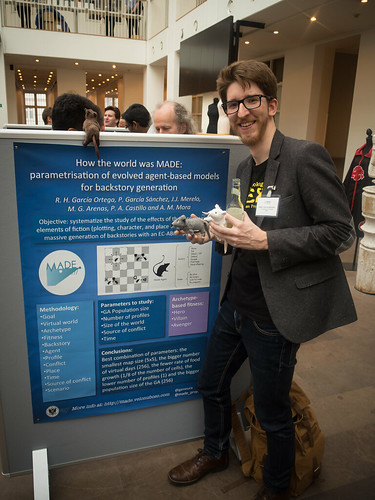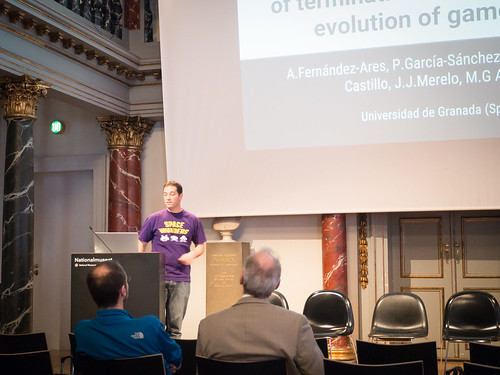We can never skip the chance to assist the Evostar conference, and aside learn the latest trends in Evolutionary Computation and present our results, we also have a good time with our other colleagues.
This time the conference was held in Copenhagen (Denmark), and because Antonio and me were part of the organization we didn’t have much time to go sightseeing, but we went to Tivoli Gardens and ride the flying chairs (and screamed like babies).
On the scientific part, we presented two papers to EvoGames track, related with our research lines on content generation for videogames and AI optimization. The first paper, How the World Was MADE: Parametrization of Evolved Agent-Based Models for Backstory Generation, presents a study on parametrization of the values that define a virtual world to facilitate the emergence of archetypes, and be able to generate interesting backstories (for videogames, for example). See the poster here:

The poster
Also, as we are commited to open science and open software, you can download the MADE environment from its web. The abstract:
Generating fiction environments for a multi-agent system optimized by genetic algorithms (with some specific requirements related to the desirable plots), presents two main problems: first it is impossible to know in advance the optimal value for the particular designed fitness function, and at the same time, it creates a vast search space for the parameters that it needs. The purpose of this paper is to define a methodology to find the best parameter values for both, the evolutionary algorithm, and the own fictional world configuration. This design includes running, to completion, a world simulation represented as a chromosome, and assigning a fitness to it, thus composing a very complex fitness landscape.
In order to optimize the resources allocated to evolution and to have some guarantees that the final result will be close to the optimum, we systematically analyze a set of possible values of the most relevant parameters, obtaining a set of generic rules. These rules, when applied to the plot requisites, and thus, to the fitness function, will lead to a reduced range of parameter values that will help the storyteller to create optimal worlds with a reduced computation budget.
 (That’s me with the IKEA rat plushies I used to describe our system)
(That’s me with the IKEA rat plushies I used to describe our system)
Our other paper, It’s Time to Stop: A Comparison of Termination Conditions in the Evolution of Game Bots, describes a methodology to compare different termination conditions in noisy environments such as the RTS games. The abstract:
Evolutionary Algorithms (EAs) are frequently used as a mechanism for the optimization of autonomous agents in games (bots), but knowing when to stop the evolution, when the bots are good enough, is not as easy as it would a priori seem. The first issue is that optimal bots are either unknown (and thus unusable as termination condition) or unreachable. In most EAs trying to find optimal bots fitness is evaluated through game playing. Many times it is found to be noisy, making its use as a termination condition also complicated. A fixed amount of evaluations or, in the case of games, a certain level of victories does not guarantee an optimal result. Thus the main objective of this paper is to test several termination conditions in order to find the one that yields optimal solutions within a restricted amount of time, and that allows researchers to compare different EAs as fairly as possible. To achieve this we will examine several ways of finishing an EA who is finding an optimal bot design process for a particular game, Planet Wars in this case, with the characteristics described above, determining the capabilities of every one of them and, eventually, selecting one for future designs.
 (Here’s Antonio presenting the paper)
(Here’s Antonio presenting the paper)
You can see the rest of the Evostar photos in their flickr account.


